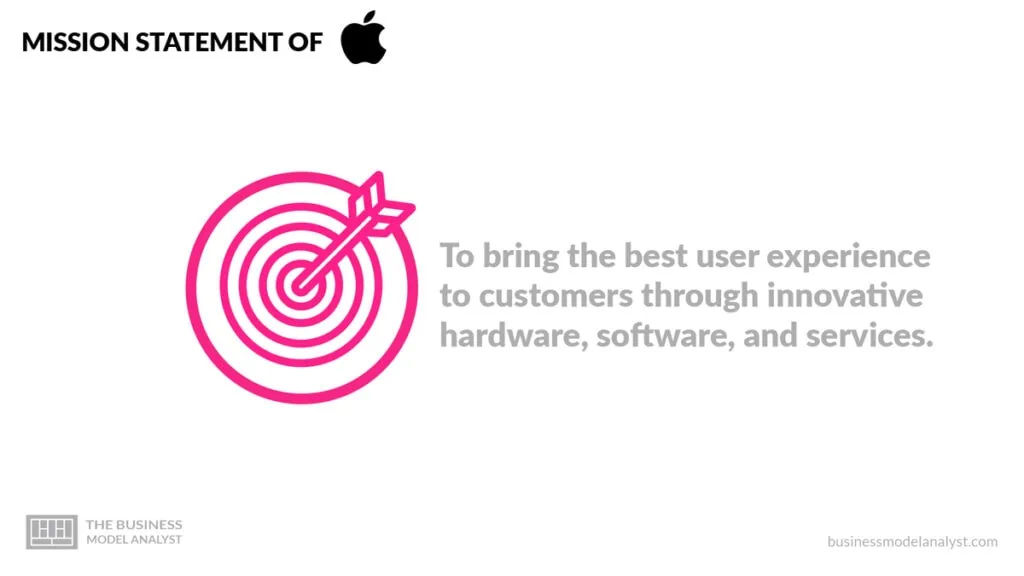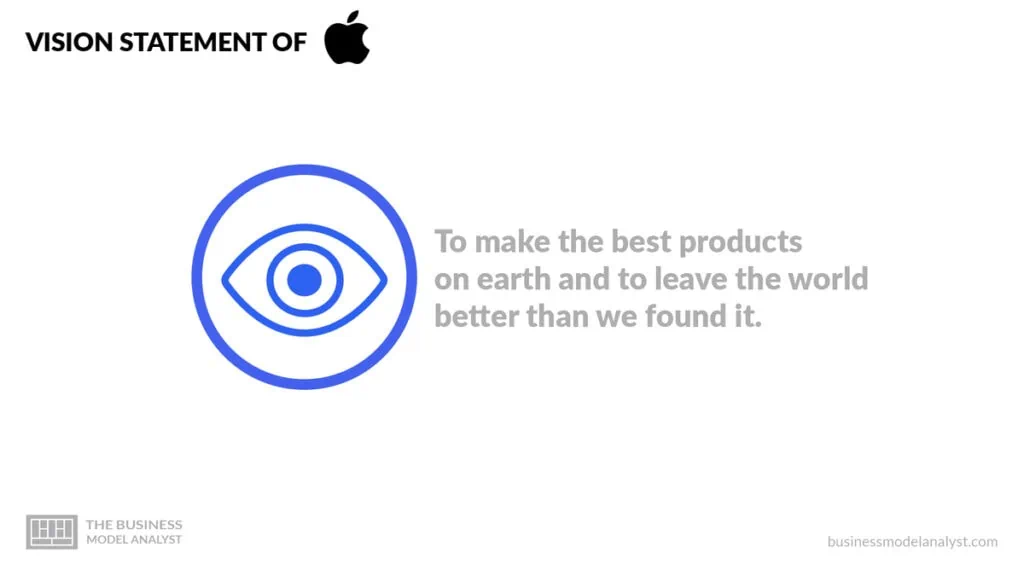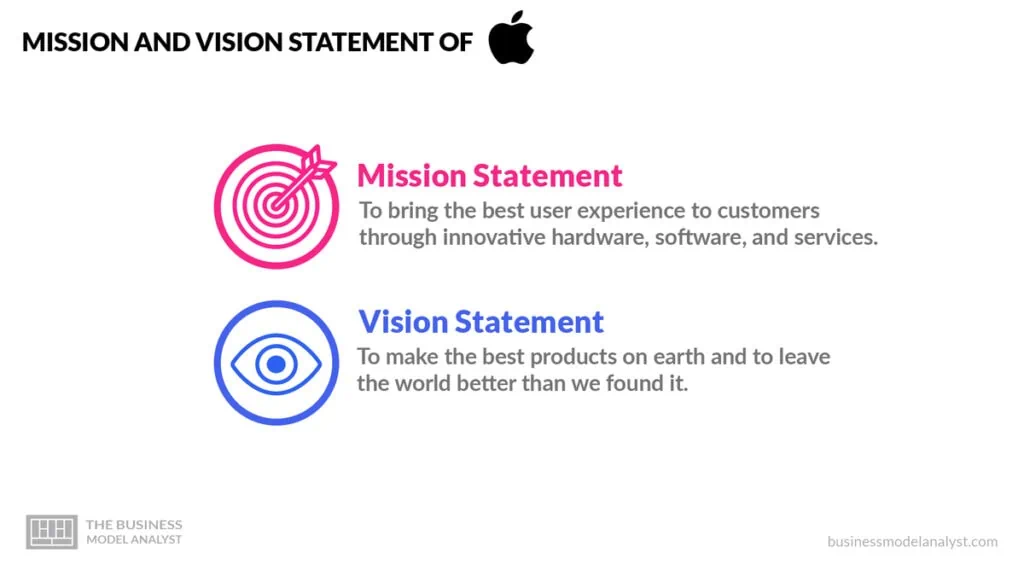Apple’s mission statement is “to bring the best user experience to customers through innovative hardware, software, and services.” Apple’s vision statement is “to make the best products on earth and to leave the world better than we found it.”
Apple is a technology corporation that has exemplified innovation, elegance, and design since its establishment in 1976. Its mission and vision statements have served to define its strategies for success within the global market, while motivating employees to support and contribute to the business’s competitive advantage.
Apple’s business strategy, intensive growth strategies, and business statements are used by the company to grapple with competition from rivals such as Samsung, Google, IBM, Dell, Lenovo, and PayPal. Over the years, these statements have been constantly adjusted according to any changes taking place in the organization under both Steve Jobs and Tim Cook’s leadership. Their messages now encapsulate diversity in strategic approaches essential for success across multiple industries like computer technology, consumer electronics, cloud computing services, and semiconductors.
The company faces intense competition, which is why its mission statement should reflect the efficient strategies needed to stay competitive while progressing into a future of authority in the global arena, as indicated by its vision statement.
Contents
Apple’s Mission Statement

Apple’s mission statement, “bringing the best user experience to customers through innovative hardware, software, and services,” is centered around delivering the best possible user experience for their customers. Through innovative technologies and services, Apple strives to provide products that meet the needs of its customers.
From hardware — such as the iPhone, the AirPods, and the MacBook Pro — to software — like iOS, macOS, iPadOS, and tvOS —, Apple continuously looks for ways to improve upon existing products and create new ones to satisfy customer demands. The mission statement encapsulates this goal, with a focus on continually innovating and providing world-class experiences no matter what product or service they offer. Ultimately, it serves as a driving force behind all decisions made at Apple, while also highlighting their commitment to customer satisfaction through every stage of their business.
Apple’s mission focuses on three key areas: best user experience, innovative products, and quality service delivery.
Best User Experience
Apple’s mission statement focuses on delivering the best user experience for its customers. Apple does not merely design products to be user-friendly, but frequently improves existing features to deliver a superior experience. Apple takes pride in creating products that are both sophisticated and easy for users to navigate.
A prime example of this commitment was the new location and Bluetooth permissions that were unveiled in iOS 13. These measures served as an added security feature that could protect personal information while also giving users more control over what data they gave companies access to.
The ad-tracking opt-in feature unveiled in iOS 14 also offered another layer of privacy protection, which can further improve the user experience with Apple devices. Consumer advocates have widely praised these changes as they have given end-users greater control over their data processing practices.
Apart from these large updates, Apple continues its focus on providing the best user experience through small changes such as adding new emojis or releasing software updates with bug fixes, faster experiences, and more secure data storage options for its customers’ peace of mind. By offering these features, Apple strives to provide superior customer service, which boosts consumer loyalty and trust in the brand — further cementing its position as one of the leading tech companies worldwide.
Innovative Products
Apple is well known for its innovative products that meet the ever-changing needs of customers around the world. From groundbreaking iPhones, iPads, and Macs to top-of-the-line Apple Watches and AirPods, Apple’s product range has been consistently evolving since its founding. Apple designs these products with the intention of making them simple and elegant, while also creating an intuitive user experience. As a result, they often solve complex problems in creative ways that no one else has thought of before.
Take their award-winning iPhone as an example — it revolutionized how people communicate by combining a computer, communication device, entertainment center, and camera all into one package. This same level of innovation can be seen across Apple’s portfolio, such as the iPad, which provides portability and ease of use; various lines of Mac computers, including iMac desktops; watches like the revolutionary Series 4 and 5 that detect heart irregularities; headphones like AirPods with high audio fidelity; powerful tablets like iPad Pros for business users; etc.
In healthcare specifically, Apple has made great strides toward improving healthcare outcomes through its innovative products. In particular, their watchOS 6 features fall detection technology to alert emergency services if a patient falls and does not respond afterward within 60 seconds. It provides access to health records on iPhones for patients — allowing real-time updates about events such as hospital visits or doctor appointments without needing to visit a medical facility or call your provider — thus saving precious time and money when seeking medical care.
More than 40 years ago, Steve Jobs co-founded the company with dreams of revolutionizing how technology could be used to make life better — today, this remains true with its constantly evolving suite of product offerings explicitly designed with customer usability & satisfaction at heart every step of the way — delivering unparalleled value & experiences across markets ranging from education to business & most significantly healthcare, where some truly groundbreaking advancements are now being made possible due to their relentless focus on innovation.
Quality Service Delivery
Apple strives to continually provide its customers with a consistently high level of quality service delivery. From product design to post-sale customer support, Apple carefully oversees every detail to ensure that each user’s experience is as positive and enjoyable as possible.
One key aspect of Apple’s commitment to quality service delivery is the App Store, which offers a wealth of apps whose interfaces are designed with both form and function in mind. Every app available on the platform undergoes rigorous evaluation before it can be approved for release, ensuring only top-notch options make their way into users’ hands. The same goes for hardware products: Apple has strict design guidelines that adhere to the company’s engineering standards, helping ensure that products — like the iPhones, the iPad, and the MacBook — not only look extraordinary, but also perform at their peak capabilities.
The next piece of Apple’s puzzle is its implementation of customer service programs like Apple Care and tech support. All staff members employed by these services have received extensive training so that they can offer world-class assistance when faced with any product or software-related query or problem from customers; from basic troubleshooting advice to more complex technical issues, all get addressed quickly by trained professionals who have access to relevant resources needed for a successful resolution.
Both customers and industry professionals acknowledge Apple’s commitment to providing outstanding service. In 2020, a survey deemed Apple’s online support 51/60, phone support 34/40, and cumulative tech support score of 85/100 — demonstrating the exceptionally high level of customer care they give. This impressive rating reflects how seriously Apple considers its responsibility to ensure users are completely satisfied with their technological purchases by offering unparalleled assistance at every stage of their experience.
Apple’s Vision Statement

Apple’s vision statement, “To make the best products on earth and to leave the world better than we found it,” drives the company’s ambition to continually innovate with an eye towards providing more meaningful experiences for their users and making a positive impact on society. This mission serves as a North Star for Apple’s employees, from leadership down to product teams and support staff.
This statement comprises two parts:
Product Design Leadership
Apple’s product design leadership is well established, both in terms of its sheer scope and its success. For example, the company has created iconic products such as the iPhone, the AirPods, the MacBooks, M1 microchips, etc. With each release of updated and new devices, Apple seeks to continuously push for novel innovations that set the standard for industry performance and usability. As a testament to this commitment to leading product design leadership, in April 2021, Apple unveiled their next-generation iPad Pro, featuring an M1 chip that surpasses the competition with ultra-fast 5G capabilities.
With its fantastic speed, the iPad Pro enabled Apple to cement its place at the forefront of mobile device technology, while at the same time offering customers unprecedented levels of speed and data access when they needed it most. With this level of innovation from Apple, it comes as no surprise that many analysts expect them to maintain their current market share lead in mobile computing for many years ahead.
The company has also been successful at protecting its leadership in other product sectors, such as wearables like AirPods and smartwatches with features like heart rate monitoring that provide consumers access to lifestyle tracking capabilities unheard of just a few years ago. Beyond these traditionally considered consumer products, Apple’s AirTag item tracker gives users a whole new way to ensure tracking lost items or ensuring other items stay securely stored away like wallets or keys — another testament, if ever needed — to how seriously they take providing innovative solutions across all industries they are now involved in by leveraging cutting edge technologies while keeping one eye on potential advancements down the line.
Carbon Neutral
Apple’s vision to attain zero net climate impact across all its operations has resulted in the company committing to carbon neutrality by 2030. As part of this commitment, Apple released an Environmental Progress Report in 2020 that outlines their plan for reducing their carbon emissions by 75% and developing innovative solutions by 2030 for the remaining 25% of their footprint.
The plan developed in Apple’s Environment Progress Report focuses on three steps: reducing current emissions from operations, developing innovations to supplement reductions, and making investments in nature-based solutions such as restoring forests. To reduce current emissions, Apple plans to use energy sources such as renewable energy and recycled materials instead of virgin materials wherever possible. In addition to green initiatives like these, there are also targets set internally at Apple that seeks to reduce greenhouse gas emissions associated with the transportation of products.
Innovation is also key when it comes to Apple attaining carbon neutrality by 2030. One example is the development of new energy sources, such as hydrogen fuel cells, that could be used in computers or other consumer devices while still providing affordable electricity without disrupting the environment. Apple plans on researching novel technologies, such as advanced recycling techniques designed to extract more usable materials from already recycled goods that could be reworked into new parts for consumer products rather than relying solely on production from natural resources.
Nature-based solutions are essential for achieving carbon neutrality within Apple’s operations. For instance, investing funds in projects that focus on conservation efforts like forest restoration can help offset some of the emissions created during production processes at facilities around the world by establishing alternative reservoirs of stored atmospheric CO2, which would not have existed without human interference or intervention with ecosystems elsewhere on earth. This element can then provide a buffer against further CO2 buildup, thus helping mitigate any additional impact from operations already accounted for directly under their umbrella — thus helping maintain carbon neutrality over time even if no changes were ever made internally again after 2030, reaching a zero balance relationally between what was emitted versus what was immediately reabsorbed back into nature actively through strategic investment efforts for decades leading up until then and hopefully beyond.
Tim Cook’s quote sums up why achieving carbon neutrality is essential: “With our commitment to carbon neutrality, we hope to be a ripple in the pond that creates a much larger change.” Achieving true sustainability and reducing environmental impacts starts with individual action, and Apple’s goal of becoming completely carbon-neutral sets an admirable example demonstrating how one company can make lasting positive change when they commit themselves fully towards tangible goals such as these — providing something measurable that others can reference and aspire towards too.
Apple’s Core Values
Apple’s core values include:
- Accessibility
- Education
- Environment
- Inclusion and diversity
- Privacy
- Supplier Responsibility
Apple’s core values lie at the heart of its mission and vision statements. Apple strives to be an innovative leader in technology that is accessible, educational, and protective of the environment, while also supporting diverse cultures, privacy, and responsible supplier agreements.
Accessibility
Apple demonstrates its commitment to accessibility through initiatives such as the “VoiceOver” feature, which reads out text elements on iPads and iPhones to those who are visually impaired. In addition, by implementing Braille display support into their products, they inspire blind or limited-vision customers to explore Apple products without any stigma or insecurity — paving the way for enhanced accessibility for all.
Education
As part of its focus on education, Apple has partnered with ConnectEd, a program dedicated to providing technology resources and support services that create learning opportunities for students from underserved communities across the United States. Through this initiative alone, Apple has provided more than $100 million worth of equipment and software solutions specifically tailored toward helping these students succeed academically.
Environmental Responsibility
Apple takes environmental responsibility seriously by emphasizing energy efficiency across its product line, as well as establishing renewable energy sources wherever possible. The company uses recycled materials when manufacturing products both internally and externally while encouraging customers to use their improved recycling program called Apple Trade-In, which offers either credit or recycling for old devices depending on eligibility criteria set out by the program.
Inclusion & Diversity
At present, approximately 45% of Apple’s staff come from minority backgrounds; this statistic has continuously grown year-on-year thanks primarily to recruitment tactics designed solely around diversity. The company constantly invests heavily in creating welcoming teams with dissimilar experiences sharing one common goal — advancing human progress through technology.
Privacy
With an emphasis placed firmly upon data privacy, users are enabled to take control over what information they share when using any device belonging to the Apple “constellation” — via features like the Face ID and the Touch ID —, which add protection for user access control while leaving third parties well outside their personal data perimeter.
Supplier Responsibility
As part of its supplier responsibility policy, Apple holds itself and its suppliers accountable for creating quality products for customers while also ensuring a safe working environment free from discrimination, harassment, abuse, excessive overtime, and involuntary labor, among other conditions for which it has full knowledge of applicable laws, regulations, and standards.
Conclusion
Apple’s mission and vision statements have been instrumental in helping the company become one of the most successful and influential tech companies in the world. These two guiding principles serve as a reminder to Apple’s employees and shareholders of why they are doing what they do: making life more accessible, more sustainable, more connected, and more enjoyable through their products.
Apple’s goal is to leave a lasting legacy by creating experiences that inspire people everywhere, from students in the classroom to professional athletes on the field. From its innovative culture and design-focused approach to its commitment to protecting user privacy and the environment, Apple continues to push boundaries and offer incredible products for everyone around the world. With their vision of “leaving the world better than they found it,” there is no doubt that Apple will continue to impact our lives for years to come.


